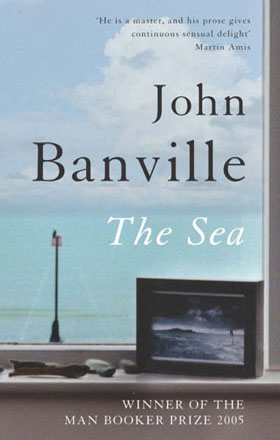
John Banville
The following novels constitute the shortlist for the 2005 Booker Prize:
2005 Longlist
Notable Omissions from the 2005 Long/Shortlist

|
The Sea John Banville |
Dustjacket synopsis:
"When art historian Max Morden returns to the seaside village where he once spent a childhood holiday, he is both escaping
from a recent loss and confronting a distant trauma.
"The Grace family had appeared that long-ago summer as if from another world. Mr and Mrs Grace, with their worldly ease and candour, were unlike any adults he had met before. But it was his contemporaries, the Grace twins (silent, expressionless Myles, and fiery, seductively poised and forthright Chloe), who most fascinated Max. He grew to know them intricately, even intimately, and what ensued would haunt him for the rest of his years and shape everything that was to follow.
"Written in Banville's precise and hauntingly beautiful prose, The Sea is both a reconciliation with loss and an extraordinary meditation on identity and remembrance. Utterly compelling, profundly moving and illuminating, it is unquestionably one of the finest works yet from a sublime master of language."
First Paragraph:
They departed, the gods, on the day of the strange tide. All morning under a milky sky the waters in the bay had swelled and swelled, rising to unheard-of heights, the small waves creeping over parched sand that for years had known no wetting save for rain and lapping the very bases of the dunes. The rusted hulk of the freighter that had run aground at the far end of the bay longer ago than any of us could remember must have thought it was being granted a relaunch. I would not swim again, after that day. The seabirds mewled and swooped, unnerved, it seemed by the spectacle of that vast bowl of water bulging like a blister, lead-blue and malignantly agleam. They looked unnaturally white, that day, those birds. The waves were depositing a fringe of soiled yellow foam along the waterline. No sail marred the high horizon. I would not swim, no, not ever again.
Someone had just walked over my grave. Someone.
From the Picador paperback edition, 2005.
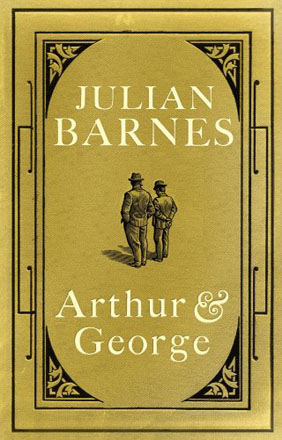
|
Arthur & George Julian Barnes |
Dustjacket synopsis:
"Arthur and George grew up worlds apart in late-nineteenth-century Britain: Arthur in shabby-genteel Edinburgh, George in
the vicage of a small Staffordshire village. Arthur becomes a doctor, then a writer; George a solicitor in Birmingham.
Arthur is to become one of the most famous men of his age, while George remains in hard-working obscurity. But as the
new century begins, they are brought together by a sequence of events which made sensational headlines at the time as The
Great Wyrley Outrages.
"With a mixture of intense research and vivid imagination, Julian Barnes brings to life not just this long-forgotten case, but the inner workings of these two very different men. This is a novel in which the events of a hundred years ago constantly set off contemporary echoes, a novel about low crime and high spirituality, guilt and innocence, identity, nationality and race. Most of all it is a profound and moving meditation on the fateful differences between what we believe, what we know and what we can prove.
"Julian Barnes has long been recognised as one of Britain's most remarkable writers. Whose those already familiar with his work will enjoy its originality, its wit, its wisdom about the human condition, Arthur & George will surely find him an entirely new audience."
First Paragraph:
A child wants to see. It always begins like this, and it began like this then. A child wanted to see.
He was able to walk, and could reach up to a door handle. He did this with nothing that could be called a purpose, merely the instinctive tourism of infancy. A door was there to be pushed; he walked in, stopped, looked. There was nobody to observe him; he turned and walked away; carefully shutting the door behind him.
What he saw there became his first memory. A small boy, a room, a bed, closed curtains leaking afternoon light. By the time he came to describe it publicly, sixty years had passed. How many internal retellings had smoothed and adjusted the plain words he finally used? Doubtless it still seemed as clear as on the day itself. The door, the room, the light, the bed, and what was on the bed: a 'white, waxen thing'.
From the Jonathan Cape hardback edition, 2005.
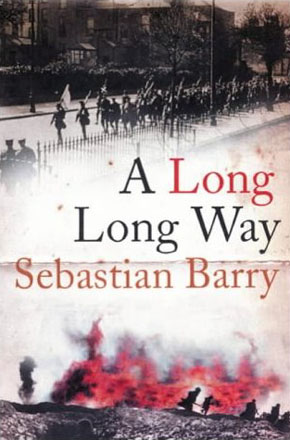
|
A Long Long Way Sebastian Barry |
Dustjacket synopsis:
"Barely eighteen years old, Willie Dunne leaves Dublin in 1914 to fight for the Allied cause, largely unaware of the
growing political and religious tensions festering back home.
"Told in Sebastian Barry's characteristically beautiful prose, A Long Long Way evokes the camaraderie and humour of Willie and his regiment, The Royal Dublin Fusiliers, but also the cruelty and sadness of war, and the divided loyalties that many Irish soldiers felt. Tracing their experiences through the course of the war, the narative brilliantly explores and dramatises the events of the Easter Rising within Ireland, and how such a seminal political moment came to affect those boys off fighting for the King of England on foreign fields -- the paralysing doubts and divisions it caused them.
"It also charts Willie's coming of age, his leaving behind of his sweetheart Gretta, and the effect the war has on his relationship with his father, a member of the Dublin Metropolitan Police and a fervent loyalist. Running throughout is the question of how such young men came to be fighting in a war, and how they struggled with the events that raged around them."
Quotes:
"This is Sebastian Barry's song of innocence and experience, composed with poetic grace and an eye, both unflinching and
tender, for savage detail and moments of pure beauty. It is also an astonishing display of Barry's gift for creating a
memorable character, whom he has written, indelibly, back into a history which continues to haunt us." - Colm
Tóibín
"Many say Sebastian Barry writes like an angel and they are right, provided they remember he is on the side of the angels
that fell. He shares his longing that his heroes might roar with a horrified I will not serve. But they do
serve and are destroyed. Then his sympathy overwhelms, as it does in A Long Long Way. A possessed, powerful
novel." - Frank McGuinness
"A deeply moving story of courage and fidelity" - J.M. Coetzee
First Paragraph:
He was born in the dying days.
It was the withering end of 1896. He was called William after the long-dead Orange King, because his father took an interest in such distant matters. On top of that, an old great-uncle, William Cullen, was yet living in Wicklow, across the mountains as they used to say, where his father himself had been reared.
The winter sleet bit into the Dublin cab-men, where they gathered in their mucky gabardines by the Round Room in Great Britain street. The stony face of the old building remained indifferent, with its strange decoration of ox-skulls and draperies.
The new babies screeched inside the thick grey walls of the Rotunda Hospital. Blood gathered on the nurses' white laps like the aprons of butchers.
He was a litte baby and would always be a little boy. He was like the thin upper arm of a beggar with a few meagre bones shot though him, provisional and bare.
When he broke from his mother he made a mewling sound like a wounded cat, over and over.
From the faber and faber paperback edition, 2005.

|
Never Let Me Go Kazuo Ishiguro |
Dustjacket synopsis:
"Kazuo Ishiguro has been acclaimed in the Sunday Times for 'extending the possibilities of fiction'. In Never Let Me
Go he has fashioned another remarkable story -- a story of love, loss and hidden truths -- that takes its place among
his finest work.
"Kathy, Ruth and Tommy were pupils at Hailsham -- an idyllic establishment situated deep in the English countryside. The children there were tenderly sheltered from the outside world, brought up to believe they were special, and that their personal welfare was crucial. But for what reason were they really there?
"It is only years later that Kathy, now aged thirty-one finally allows herself to yield to the pull of memory. What unfolds is the haunting story of how Kathy, Ruth and Tommy slowly come to face the truth about their seemingly happy childhoods -- and about their futures.
"Never Let Me Go is a uniquely moving novel, charged throughout with a sense of the fragility of our lives."
First Paragraph:
My name is Kathy H. I'm thirty-one years old, and I've been a carer now for over eleven years. That sounds long enough, I know, but actually they want me to go on for another eight months, until the end of this year. That'll make it exactly twelve years. Now I know my being a carer so long isn't necessarily because they think I'm fantastic at what I do. There are some really good carers who've been told to stop after just two or three years. And I can think of one carer at least who went on for all of fourteen years despite being a complete waste of space. So I'm trying not to boast. But then I do know for a fact they've been pleased with my work, and by and large, I have too. My donors have always tended to be much better than expected. Their recovery tmes have been impressive, and hardly any of them have been classified as 'agitated', even before fourth donation. Okay, maybe I am boasting now. But it means a lot to me, being able to do my work well, especially that bit about my donors staying 'calm'. I've developed a kind of instinct around donors. I know when to hang around and confort them, when to leave them to themselves; when to listen to everything they have to say, and when to just shrug and tell them to snap out of it.
From the Faber and Faber paperback edition, 2005.
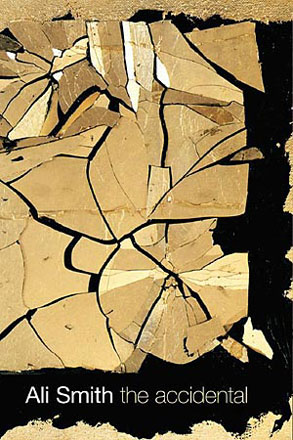
|
The Accidental Ali Smith |
Dustjacket synopsis:
"'I was born in the year of the supersonic, the era of the multistory multivitamin multtonic; the highrise time of men
with the technology and women who could be bionic, when jump-jets were Harrier, when QE2 was Cunard, when thirty-eight
feet tall the Princess Margaret stood stately in her hoverpad, the année érotique was only thirty aircushioned
minutes away and everything went at twice the speed of sound. I opened my eyes. It was all in colour. It didn't look like
Kansas any more. The students were on barricades, the mode was maxi, the Beatles were transcendental, they opened a shop.
It was Britain. It was great.'
"Ali Smith's Hotel World was shortlisted for the Booker and Orange prizes in 2001. In this new novel, she goes even further in developing her unique and brilliant literary voice."
Quotes:
"Ali Smith is a true original" - Joyce Carol Oates
"I love Ali Smith's work" - Jeanette Winterson, The Times
First Paragraph:
My mother began me one evening in 1968 on a table in the café of the town's only cinema. One short flight of stairs away, up behind the balding red velvet of the Balcony curtain, the usherette was yawning, dandling her off torch, leaning on her elbow above the rustlings and tonguings of the back row and picking at the wood of the partition, flicking little splinters of it at the small-town heads in the dark. On the screen above them the film was Poor Cow, with Terence Stamp, an actor of such numinousness that my mother, young, chic, slender and imperious, and watching the film for the third time that week, had stood up, letting her seat thud up behind her, pushed past the legs of the people in her row and headed up the grubby aisle to the exit, through the curtain and out into the light.
The café was empty except for the boy putting chairs on tables. We're just shutting, he told her. My mother, still blinking from the dark, picked her way down the scuffed red stairs. She took the chair he was holding and put it, still upside down, down on the ground. She stepped out of her shoes. She unbuttoned her coat.
From the Hamish Hamilton paperback edition, 2005.
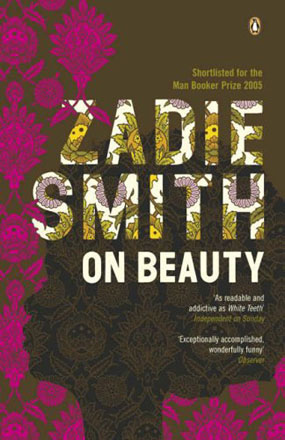
|
On Beauty Zadie Smith |
Dustjacket synopsis:
"Why do we fall in love with the people we do?
Why do we visit our mistakes on our own chldren?
What makes life truly beautiful?
"Set in New England mainly and London partly, On Beauty concerns a pair of feuding families -- the Belseys and the Kippses -- and a clutch of doomed affairs. It puts low morals among high ideals and asks some seraching questions about what life does to love. For the Belseys and the Kippses, the confusions -- both personal and political -- of our undertain age are about to be brought close to home: right to the heart of the family."
Quotes:
"Wonderfully funny. An outstanding novelist with a powerful understanding both of what the brain knows and of what love
knows" - Observer
"Glorious. Wonderfully engaging, wonderfully observed...that rare thing: a novel that is as affecting as it is
entertaining" - New York Times
First Paragraph:
One may as well begin with Jerome's e-mails to his father:
To: HowardBelsey@fas.Wellington.edu
From: Jeromeabroad@easymail.com
Date: 5 November
Subject:
Hey Dad -- basically I'm just going to keep on keeping on with these mails -- I'm no onger expecting you to reply, but I'm still hoping you will, if that makes sense.
Well, I'm really enjoying everything. I work in Monty Kipps's own office (did you know he's actually Sir Monty??), which is in the Green Park area. It's me and a Cornish girl called Emily. She's cool. There're also three more yank interns downstairs (one from Boston!), so I feel pretty much at home. I'm a kind of an intern with the duties of a PA -- organizing lunches, filing, talking to people on the phone, that sort of thing. Monty's work is much more than just the academic stuff: he's involved with the Race Commission, and he has Church charities in Barbados, Jamaica, Haiti, etc. -- he keeps me really busy. Because it's such a small set-up, I get to work closely with him -- and of course I'm living with the family now, which is like being completely integrated into something new. Ah, the family. You didn't respond, so I'm imagining your reaction (not too hard to imagine...). The truth is, it was really just the most convenient option at the time. And they were totally kind to offer -- I was being evicted from the 'bedsit' place in Marylebone. The Kippses aren't under any obligation to me, but they asked and I accepted -- gratefully. I've been in their place a week now, and still no mention of any rent, which should tell you something. I know you want me to tell you it's a nightmare, but I can't -- I love living here. It's a different universe. The house is just wow -- early Victorian, a 'terrace' -- unassuming-looking outside but massive inside -- but there's still a kind of humility that really appeals to me -- almost everything white, and a lot of handmade things, and quilts and dark wood shelves and cornices and this four-storey staircase -- and in the whole place there's only one television, which is in the basement anyway, just so Monty can keep abreast of news stuff, and some of the things he does on the television -- but that's it.
From the Penguin paperback edition, 2006.
The Harmony Silk Factory, Tash Aw
Slow Man, J.M. Coetzee
In the Fold, Rachel Cusk
All For Love, Dan Jacobson
A Short History of Tractors in Ukranian, Marina Lewycka
Beyond Black, Hilary Mantel
Saturday, Ian McEwan
The People's Act of Love, James Meek
Shalimar the Clown, Salman Rushdie
This Thing of Darkness, Harry Thompson
This is the Country, William Wall
This page and its contents are copyright © 2007 by Perry Middlemiss, Melbourne, Victoria, Australia.
Last modified: July 30, 2007.